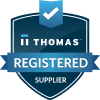Jet Engine, Turbine Makers Scramble to Find Testing for Parts, Avoid Production Delays
May 11, 2011
Test Devices doubles capacity to meet urgent demand
Hudson, MA – May 4, 2011 – Scientists and engineers creating new fuel-efficient jet engines and gas turbines are challenged to find the appropriate experimental testing needed to evaluate parts designed to run in hotter, harsher mechanical environments. To help meet this urgent need, Test Devices, Inc. has doubled its capacity to conduct high cycle fatigue testing. Test Devices is an international research and development component-testing firm based in Hudson, MA.
Test Devices had been doing Dynamic Spin Testing® in only one unit – its 54″ spin rig; but there has been more demand than only one machine could meet. “We have a very unique capability which is very well utilized; some companies don’t have the luxury to wait more than a year to do their testing,” said Robert Murner, TDI President.
By adding High Cycle Fatigue capability to an existing 42″ spin rig, Test Devices can now accommodate manufacturers that are bringing new components, materials and coatings to market. “Industry demand is high and our capability is so unique, we want to serve the growing need for high cycle fatigue testing,” said Murner. “We’re committed to helping OEM’s that need advanced testing meet deadlines and bring projects to successful completion,” continued Murner.
“The industry trend toward fuel efficiency is driving the need for different engine materials. It is critical for OEMs to evaluate their innovative materials and new designs for hotter engine components in realistic engine environments,” said Dr. Hiro Endo, Chief Technology Officer at Test Devices.
When Test Devices unveiled its Dynamic Spin Rig® it became the only company in the world that could apply extreme heat, vibration and centrifugal pull simultaneously on rotating airfoils; but the advanced nature of this exclusive dynamic spin test has led to extraordinary demand as manufacturers accelerate research and development of high-efficiency engines.
Test Devices is still the only private test laboratory that can conduct Dynamic Spin Testing and this has created an extraordinary demand to increase its capacity. “Many coatings and materials designed to run in high-efficiency engines and turbines are brand new, so there is no body of knowledge scientists and engineers can use to confirm their assumptions. Dynamic Spin Testing is an effective way for developers to validate their models,” stated Endo.
Without Dynamic Spin Testing manufacturers typically test airfoil resonance on a shaker table to simulate vibration. A separate test was needed to exert mechanical and thermal stress. Because they were conducted separately, each test delivered isolated, limited information that was unable to show the combined effect of heat, vibration and centrifugal force on a rotating part. Test Devices facility employs two methods for HCF excitation. “We are continuing to invest in new methods and capabilities for HCF testing, including expanding our capacity and evaluating new excitation methods.” said Murner.
“Individual tests give you little pieces of information and you try to put that information together into a composite, but our capabilities allow you to get very focused data under appropriate conditions. Our offerings provide a more robust, in-depth solution,” said Murner.
About Test Devices
For over 30 years, Test Devices, Inc. has been the world’s premier source for rotational testing equipment and services. Test Devices provides advanced technology spin testing services to customers in a wide variety of industries. The company works with developers and producers of high-speed rotational components of jet engines, gas turbines, medical centrifuges, machine tools, industrial compressors, and high-speed electric motors, among others. For more information contact David Woodford at +1-978-562-4923, woodford@testdevices.com, or visit www.testdevices.com.




